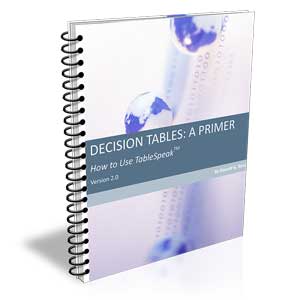The Terminator ~ I'll be Back (with Just the Right Term)
In everyone's life, there is always someone -- a teacher, a mother, a friend, a business colleague, whoever -- who insists (maybe gently, maybe not) that things should be called by their right names. This is a person who always seems to have several words to choose from to put just the right spin on things. He or she forever has a dictionary at the ready and is never loath to use it no matter what the nature or objective of the discourse. Excels at word games. Easily coins nicknames for new ideas. Someone who knows that coining new terms is called neology.
Such people are the ones always called upon to do 'wordsmithing' (usually not meant as a compliment). They are naturally good at turning a phrase. They think writing definitions is a really fun thing to do. As for grammar, where the rest of us see purgatory, they find poetry. They may have even been liberal arts majors!
I have news. 'Wordsmithing' is a must-have skill for your business rule project. I mean fluency in BusinessSpeak, as opposed to SystemSpeak or TechnoSpeak. You need at least one team member who insists that things are always called by their right names and that proper definitions are always worked out and written down.
What you need is a terminator. That is what they have been called -- with respect, I hope -- on some of our business rules projects.
Why is a 'terminator' so fundamentally important? Remember the business rule mantra: Rules build on facts, and facts build on terms. Terms and their definitions are the foundation in the business rule approach. Build on a weak foundation, and your whole business logic becomes a house of cards.
We do need to be a bit more dignified about the job's name, of course. Let me share a little research I did on this with you.
Ever heard of a glossagrapher? In case you are wondering, no, a glossagrapher is not someone who is good at 'glossing things over.' I did not make up the term either. It is real term, as well as an honorable profession (I presume).
As it happens, one of the definitions of gloss is "a brief explanation of a difficult word or expression." A glossagrapher then is (loosely) someone who writes stuff like that down. Unfortunately, another definition for 'gloss' is "a false and often willfully misleading interpretation." That is not going to do.
What about lexicographer? This term means "the author or editor of a dictionary or lexicon." A lexicon is the "vocabulary of a language, an individual speaker, or a subject." This sense is exactly right for what we need, but the word itself is somewhat obscure and a bit hard to say. Are there any other candidates?
Donald Chapin of Business Semantics, Ltd. informs me that The New Oxford Dictionary of English indicates terminologist to be a word in contemporary usage. That label is a good one. Since the business rule approach so strongly emphasizes development of terms, 'terminologist' is a natural.
In a single word, what does a 'terminologist' need in order to be successful with business rules? Perhaps the key to success might be called termiphilia. If there is any better word for 'sheer love of terminology,' I'll be back.
# # #
About our Contributor:
Online Interactive Training Series
In response to a great many requests, Business Rule Solutions now offers at-a-distance learning options. No travel, no backlogs, no hassles. Same great instructors, but with schedules, content and pricing designed to meet the special needs of busy professionals.










How to Define Business Terms in Plain English: A Primer
How to Use DecisionSpeak™ and Question Charts (Q-Charts™)
Decision Tables - A Primer: How to Use TableSpeak™
Tabulation of Lists in RuleSpeak®: A Primer - Using "The Following" Clause
Business Agility Manifesto
Business Rules Manifesto
Business Motivation Model
Decision Vocabulary
[Download]
[Download]
Semantics of Business Vocabulary and Business Rules